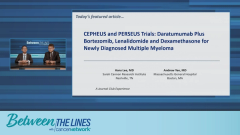
PERSEUS Trial: MRD Negativity
Panelists discuss updated American Society of Clinical Oncology (ASCO) data confirming that daratumumab-based quadruplet therapy (Dara-VRD) significantly improves progression-free survival (PFS) and sustains minimal residual disease (MRD) negativity in patients with newly diagnosed transplant-eligible multiple myeloma, reducing early relapses and reinforcing this regimen as the evolving standard of care with potential for unprecedented long-term outcomes.
Episodes in this series

Updated data from this year’s ASCO meeting further confirmed the Perseus study’s findings, which demonstrated that the 4-drug regimen including daratumumab (Dara-VRD) significantly improves PFS compared with VRD alone in newly diagnosed transplant-eligible multiple myeloma. The study showed a doubling in sustained MRD negativity rates at high sensitivity (10^-5) at both 12 and 24 months with Dara-VRD. Importantly, the data also highlighted a reduced incidence of functional high-risk relapses—defined as disease progression within 18 months of treatment initiation—in the Dara-VRD arm, emphasizing that this regimen not only deepens response but also decreases early relapse risk.
These findings reinforce the growing consensus that a 4-drug regimen including a CD38 monoclonal antibody should be the standard of care for newly diagnosed transplant-eligible patients. The improved sustained MRD negativity is viewed as a key factor in improving long-term outcomes, potentially moving closer toward the goal of curing some patients. Modeling data presented at the European Myeloma Network meeting suggested projected PFS could reach as long as 17 years with this approach—an unprecedented outcome compared with historical data with 3-drug regimens that showed median PFS at around 5 to 6 years.
While longer follow-up is needed to definitively determine if a subset of patients can be cured, the pathway to durable remissions appears to hinge on achieving and maintaining deep MRD negativity. This is especially critical in high-risk patients, for whom sustained MRD negativity is necessary for durable disease control. Overall, the updated data underscore the importance of incorporating daratumumab into induction and maintenance therapy to maximize response depth, reduce early relapses, and potentially improve long-term survival in newly diagnosed transplant-eligible multiple myeloma.
Newsletter
Stay up to date on recent advances in the multidisciplinary approach to cancer.



































